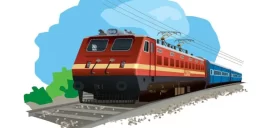10.1.0 Introduction to Issue and Distribution of stores :
Stores Depot receives, inspects and stores various materials for the basic purpose of issuing them to various consumers of the Railways. These consumers may be various subordinates/officers of the divisions or other units such as workshop etc. and they may require the materials either for maintenance and operation or for new works. Therefore, the depot has to ensure a good system of issue of the materials to cater to all types of issues to all types of indentors. The system has to ensure following basic things.
(a) Materials should be issued on proper authority i.e. there should be a proper requisition from the indentor.
(b) There should be a proper system of keeping records of all requisitions submitted by the indentors so that various queries of the indentors about compliance of their requisitions may be adequately dealt with. This system should also be capable of providing managerial information required to monitor the productivity of the system and also to improve the same.
(c) There should be a system of detecting a demand which is placed by the indentor for the quantity which is more than the quantity sanctioned for him by the competent authority. (In Railways this system exists for imprest stores, few Consumables and stationary items.)
(d) Issues should be made without any delay.
(e) There should be a proper system of keeping accountal of the issues and raising timely debits to the units to whom the materials have been issued. For this all concerned officers/officials should be informed in time about the issue of the material.
(f) Materials once issued, should not form a part of the physical inventory of the stocking ward.
(g) There should be minimum possible wastage due to retail issues etc.
(h) Materials issued should be correctly measured.
10.2.0 Issue Procedure System of issues being followed in most of stores Depots on Indian Railways is described as under:
10.2.1 Different types of forms have been designed to deal with different types of requests for issue of materials. These forms are –
i. Requisition for stores (S-1313) or S.1302
ii. Combined requisition & Issue Note (S 1313 / S-1319).
iii. Imprest recoupment schedule (S 18 30)
iv. Issue tickets (for workshop items).
v. Depot transfer orders, Depot transfer requests.
10.2.2 All these requisitions are received in a centralized section in the Depot. This section may be either a part of General section or this job may be entrusted to the Ledger section. All the requisitions on receipt, are entered in a Requisition Register, in a chronological order.
o Requisition registers may be maintained Division-wise.
o In some of the Depots, Division-wise requisition registers are maintained `date of requisition wise` and all the requisitions of a particular date are entered on the page allotted for that date. This system is convenient to locate the requisition details when needed but it is difficult to get details of daily receipt of requisitions.
o After introduction of computers in the Depots this works of maintaining Requisition Register is being taken on the computer. For this different types of formats have been provided for different types of requisition and data is directly entered through a menu driven program.
o As per para 1307 of Store Code, Requisition Register should have following details : . .
10.2.3 Scrutiny of Requisitions : After entering details in the Requisition Register, requisitions are scrutinized to see that the requisitions have been properly prepared and allocation i.e. Head of Account to which expenditure is to be charged is correctly given. There should also be no ambiguity in PL No. and description of the material demanded.
o Scrutiny of requisitions is done by Ledger section, if there is a centralized ledger section, otherwise this work is done by the ward.
o In some of the Depots quantity to be issued is also authorized by the Ledger section and this role of Ledger section becomes important when the item is running in short supply. If the material is out of stock, then the requisition is kept pending. As per para 1336 of Stores Code, Pending demand sheets should be maintained by the Ledger section separately for each PL No.
o In case of raw materials, it is to be checked whether the stocks have not already been reserved against work orders placed on shops.
10.2.4 For imprest items or consumable stores for which indentors are sanctioned specific quantities (for a specific period) by their controlling officers, separate registers are required to be maintained to ensure that materials in excess to sanctioned quantity are not issued, otherwise it may result in short supply of the material to other indentors.
10.2.5 As per para 1307-S all requisitions should be forwarded to stocking wards within 24 hours of their receipt in the Depot office.
10.3.0 Issue of material and Granting of Issue note nos. : All the requisitions, imprest recoupment schedules, Depot transfer etc. are finally received in the stocking ward for the purpose of issue of the material. The DSK Stocking Ward will take the quantity out from the stocking bin and will either deliver to dispatch section or keep it separate in a corner, If the materials are not immediately handed over to dispatch section, they should be kept separately but safely. As far as possible original packing should not be removed. At the same time ward will prepare the Issue Notes and when the materials have either been handed over to dispatch section or are kept separate for handing over to dispatch section details will be entered in the Issue Register.
10.3.1 After this, Issue Note will be numbered. Issue Note No. is of eight digits.
- First two digits of Issue Note’ number represent Depot Code,
- Next two digit ward code
- Last four digits represent serial number of issue note register.
This serial number should be maintained in a continuous manner because continuity of this is watched by Stores Accounts Branch.
10.4.0 Distribution Of Different Copies Of Issue Note :
10.4.1 Combined Requisition & Issue Note (S-1313 / S-1319) :
- This is prepared by the indentor in 6 copies out of which he will submit five copies to Stores Depot which are ultimately sent to stocking ward. DSK (Stocking Ward) fills in issue particulars in all the 5 copies. After entering Issue Note number,
- DSK keeps one copy with him as his record copy.
- He forwards two copies to Ledger Section and remaining two copies are given to dispatch section along with the material.
- Ledger section after noting the details on their card forwards both the copies to Depot Stores Accounts Branch who sends one copy to EDP Center as per program fixed by the EDP Center for posting of vouchers.
- After posting the details in EDP center, this copy is received by Depot Stores Account where it is filed. The debit for the stores is to be sent by Depot Store Accounts to the consuming department.
- For this Depot Stores Accounts officer gets list of debit summaries from the computer center and on the basis of this `Advice of Transfer Debit’ are prepared.
- This Advice of Transfer Debit is sent to controlling officer of the indentor in Division Office along with one copy of the Issue Note (Note that Depots Store Account officer receives two copies of Issue Note out of which one is kept for record and the other copy forwarded to the controlling officer of the indentor).
- Dispatch Section sends two copies of Issue Note, given to it, to the indentor along-with the material. When the material is handed over to the indentor, his acknowledgment is taken on one copy and the other copy is given to the indentor.
- The acknowledgment copy taken back by the Dispatch staff and is handed over to DSK of issuing ward who will paste this along with first copy (depot record copy).
- This process of pasting acknowledgment copy with record copy is known as pairing of Issue Notes. This ensures that the material has been correctly received by the indentor.
- The one copy given to the indentor is utilized for the purpose of verification of debit summary. As per codal provisions indentor, will note down the issue details in his copy (one copy already retained by him) at the time of sending 5 copies to Stores Depot) and forward this copy to his Divisional controlling Officer, who will pair it with the copy received by him along-with debit summary. But practically in most of the divisions, indentors are deputing their representative in the divisions for verifying the debit summaries and this copy is brought back by indentor’s representative and is filed by the indentor.
This distribution of various copies of issue note can be represented as under :
Copy No. Distribution.
1 Retained by the indentor.
2 Retained by the ward as record copy.
3 Ward => Ledger Section => Depot Stores A/c=>EDP
4 Divisional Controlling Depot Officer with debit Summary
5 Ward =>Dispatch Section =>Indentor =>Acknowledged & returned for pairing with copy No.2
6 Ward =>Dispatch Section =>Indentor
10.4.2 Imprest Recoupment Schedule (Form S-1830) : This is the form used for recoupment of items sanctioned as imprest stores to various subordinates for their day to day maintenance requirements. As per para 1830-S the recoupment schedule may be submitted by the imprest holder directly without getting counter signature of their controlling officer. About 8 to 10 items can be recouped in one form.
- This form is prepared in 5 copies of which all are to be submitted to Stores Depot (S.1830) .
- One copy will be retained as office copy .
- On issue of the material 2 copies will be sent to the indentor along with the material. The indentor will record acknowledgment on both the copies and will return one copy to Depot and one copy to his divisional controlling officer.
- Two copies are sent to Depot Stores Accounts office who get the priced ledger posted in computer on the basis of one copy and one copy is for raising the debits.
10.4.3 Issues To Workshops : For issuing materials to the attached Workshops slightly different procedure is followed. Materials to the Workshops may be issued either directly from the Ward or the Depot may have a Sub-Ward which will temporarily stock the materials regularly required by the Workshops and will deliver them to the respective Shop Superintendent on `Issue Ticket’ (paras S1504 to S 1522) .
o For all the materials taken on Issue Ticket, the respective Shop Superintendent will submit Workshop Issue Note to the Sub-Ward in five copies. In case the material is taken directly from the parent Ward, the Issue Note will be submitted to the Ward.
o The Sub-Ward/Ward will retain three copies of this issue Note and return the 4th and 5th copies to the indenting Shop Supdt after giving Issue Note Number.
o The DSK-Sub ward (DSK parent Ward in the case of issue from parent Ward) will retain one copy for his record and send 2 copies along with necessary forwarding memo to the Ledger Section of the Depot for posting of numerical Ledger.
o The Ledger Section will then pass on these copies to Stores Accounts Office, who will get them posted in computer like other Issue Notes.
o Stores A/Cs Office will keep one copy for their record and forward other copy to Workshop Accounts Office along with debit summary.
o The Sub-Ward will deposit his copy of Issue Notes to the parent ward at the time of recouping materials for his Sub-Ward. The Shop Supdt. will daily submit a copy of Issue Note received by him to his Works Manager who will scrutinize and after accepting will forward it to Workshop Accounts Officer daily.
o The Other copy will be retained by shop superintendent.
o Workshop Accounts Officer will pair the copy sent by W.M. with the copy received from Stores Accounts Office along with the debit summary and will take up any discrepancies with the Stores Dept.
10.4.4 Other Items :
(a) Uniform : For these items, demands are to be submitted on requisition form indicating the PL Nos., size etc. Demands are to be submitted & complied as under :
Demands not complied with / not canceled and remain out standing till complied.
(b) Book & forms & stationary items : Demands for these items are to be submitted in prescribed printed forms (combined requisition cum issue note.) Quantity demanded be as per the Quantity sanctioned. Normally 3/6 months requirement is issued at a time. Demands not complied are to be taken as canceled for future requirement.
(c) Tickets : Demands for tickets are submitted by each station on special indent forms sent to Ticket printing press through Traffic Account Office. Stations are required to submit demands during the months nominated for submission (2 or 3 months in a year.) Quantity demanded is based on the stock, consumption. Buffer stock limit etc., Emergent indents are to be complied by the press on priority basis.
10.5.0 Distribution Of Stores To The Indentors : On a Zonal Railway there are thousands of indentors situated all along the Railway line, hundreds of kilometers away from the supply point. It is very essential that materials required by these indentors are received by them regularly to avoid any dislocation in their work.
10.5.1 The Railway’s Stores depots arrange distribution of these materials by one of the following methods :
(a)Collection of materials by the duly authorized representatives of the indentors-this is generally followed by the Workshops where the stores depots are attached to workshops In this method it is to be ensured by Store staff that the person is duly authorized and clear acknowledgment of materials is obtained from him.
(b) Delivery of stores by road – through departmental motor lorries for indents situated nearby.
(c) Dispatch by Rail as smalls – for consignments which do not form a full wagon load.
(d) Dispatch of full wagon loads – This is generally resorted to when the demands are for quantities which will constitute a full wagon load for a consignee.
(e) Dispatch through stores delivery van system – Stores delivery van system is an important service run by the stores department so that every station on the entire Railway system receives the supply of materials required by it. Materials are loaded station wise in the stores delivery vans and these delivery vans move from station to station as per a scheduled program which is finalized in advance in consultation with operating department. The staff who accompany the delivery vans deliver the materials required at the station and also collect certain items which are to be returned by the stations to the stores depots.
The important advantages of the stores van service are the
- speedier service,
- less breakage and damage in transit,
- avoiding loss or pilferage in transit,
- reduction in cost of packaging and collection of returned stores.
- Settlement of dispute at site – personal contact.











